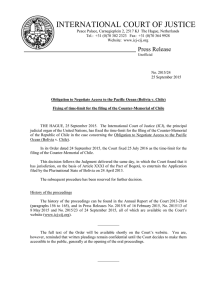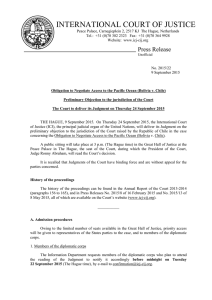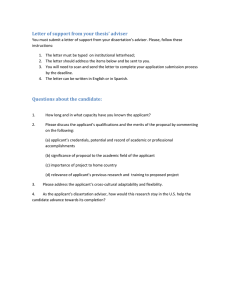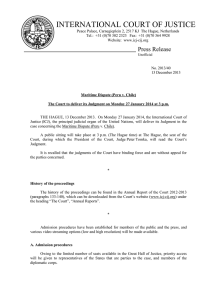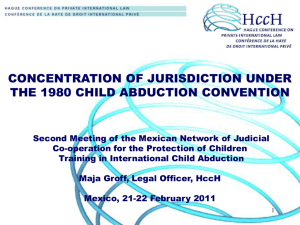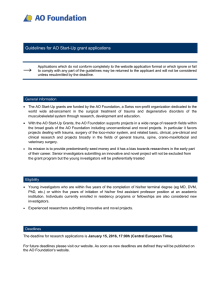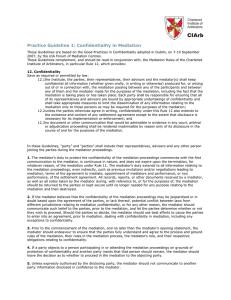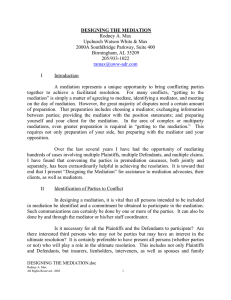Best practice guide - european e
Anuncio
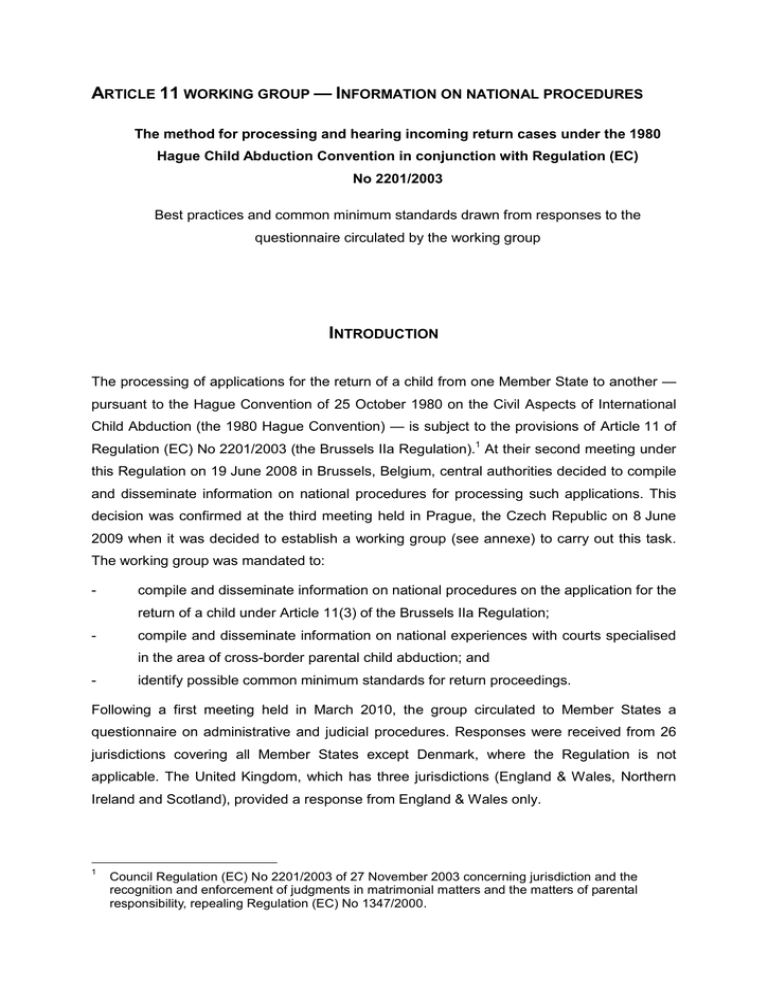
ARTICLE 11 WORKING GROUP — INFORMATION ON NATIONAL PROCEDURES The method for processing and hearing incoming return cases under the 1980 Hague Child Abduction Convention in conjunction with Regulation (EC) No 2201/2003 Best practices and common minimum standards drawn from responses to the questionnaire circulated by the working group INTRODUCTION The processing of applications for the return of a child from one Member State to another — pursuant to the Hague Convention of 25 October 1980 on the Civil Aspects of International Child Abduction (the 1980 Hague Convention) — is subject to the provisions of Article 11 of Regulation (EC) No 2201/2003 (the Brussels IIa Regulation).1 At their second meeting under this Regulation on 19 June 2008 in Brussels, Belgium, central authorities decided to compile and disseminate information on national procedures for processing such applications. This decision was confirmed at the third meeting held in Prague, the Czech Republic on 8 June 2009 when it was decided to establish a working group (see annexe) to carry out this task. The working group was mandated to: - compile and disseminate information on national procedures on the application for the return of a child under Article 11(3) of the Brussels IIa Regulation; - compile and disseminate information on national experiences with courts specialised in the area of cross-border parental child abduction; and - identify possible common minimum standards for return proceedings. Following a first meeting held in March 2010, the group circulated to Member States a questionnaire on administrative and judicial procedures. Responses were received from 26 jurisdictions covering all Member States except Denmark, where the Regulation is not applicable. The United Kingdom, which has three jurisdictions (England & Wales, Northern Ireland and Scotland), provided a response from England & Wales only. 1 Council Regulation (EC) No 2201/2003 of 27 November 2003 concerning jurisdiction and the recognition and enforcement of judgments in matrimonial matters and the matters of parental responsibility, repealing Regulation (EC) No 1347/2000. 2 The group drew up a comprehensive report summarising responses to each question and describing how central authorities and courts in Member States process return applications under the 1980 Hague Convention. The report was discussed at the fifth meeting of central authorities on 21 June 2010 in Budapest, Hungary and subsequently revised by the working group. At the same meeting, it was decided that the group should prepare a working document on best practices and the feasibility of establishing common minimum standards for return proceedings. This document was discussed at the sixth meeting of central authorities on 10 October 2012 in Nicosia, Cyprus. Following further amendments, it was finalised for the seventh meeting of central authorities on 27 June 2013 in Dublin, Ireland. The working document is not intended as a comprehensive guide on the handling of Hague return applications. Rather it reflects common minimum standards in Member States on fundamental issues concerning the application of the 1980 Hague Convention — where such common standards could be identified — and it recommends best practices derived from responses to the questionnaire. Responses to some questions have been grouped together as they concern different aspects of the same issue (e.g. filing a return application with the court and representation of the applicant in court proceedings); in these cases, common minimum standards and best practices are described jointly. Moreover, this document does not repeat information contained in individual responses which might shortly be outdated, such as contact details, or details on the name and source of implementing legislation in individual jurisdictions. For further details on any of the jurisdictions covered, the reader is referred to the individual responses to be published on the internet together with this document. Further information and recommendations can be consulted in the Guides to Good Practice on the 1980 Hague Convention that have been published by the Hague Conference on Private International Law.2 2 Available at www.hcch.net, ‘Publications’, ‘Guides to Good Practice’: http://www.hcch.net/index_en.php?act=publications.listing&sub=4 3 Part I: Administrative procedures / central authority practice GENERAL 1. Implementing legislation — Please provide a copy of the legislation that your State implemented so that you are able to meet the obligations imposed by the Convention/Regulation. Best practice: It is recommended that States enact implementing legislation or other provisions, as appropriate, to ensure that the specific requirements of the 1980 Hague Convention are met, in particular for expeditious proceedings. Common minimum standards: Nearly all Member States already have such implementing legislation or are in the process of enacting it. ADMINISTRATIVE FUNCTIONS OF THE CENTRAL AUTHORITY RECEIVING THE REQUEST 2. Please provide central authority contact details including telephone number, fax number and email address. Please also provide information on languages spoken, if any. 3. Does the central authority require that new incoming applications be translated into the appropriate language? 4. Will the application be formally acknowledged by the central authority and how quickly? What is the central authority’s preferred method of communication — email, fax or post? Best practice: Regarding translations, Article 24 of the 1980 Hague Convention requires any application under the Convention for the return of a child to be accompanied by a translation into the official language, or one of the official languages, of the requested State. Consequently, translations by the requested central authority itself should generally only be required in emergency situations. In such situations, States should be prepared to provide this service wherever possible. It is recommended that central authorities acknowledge receipt of an incoming application within 2 – 3 working days of receipt. 4 In general, swift methods of communication, such as email or fax, are preferable for all communications in ongoing cases unless original documents are required. Common minimum standards: It appears that all but two central authorities already acknowledge receipt of an incoming application. The processing time of 2 – 3 working days reflects the average time needed by central authorities. 5. Would your central authority refuse an incoming application under Article 27? If so, under what conditions? Best practice: In cases of doubt, it is recommended that central authorities contact the requesting central authority or applicant, who should be warned about a possible rejection and be given the opportunity to supplement their submissions. Moreover, central authorities should issue refusals only in obvious cases. If cases depend on the taking of evidence or judicial appreciation of facts (e.g. relating to an applicant’s claim as to where the child’s habitual residence is, whether rights of custody exist or are exercised or not, and whether the child has settled into the new environment) these should not be subject to refusal. Examples for obvious cases for refusal would be: - A child is aged over 16; - The alleged habitual residence of the child before removal or retention was in a noncontracting state. In cases of refusal, applicants should be reminded that Article 29 of the 1980 Hague Convention allows them to bring return proceedings directly without involving a central authority. Under the first recommendation above, central authorities are called upon to use their power to reject an application with caution. Nevertheless, financial aspects must be taken into account in legal systems where costs will necessarily be incurred by the applicant if the case goes to court. In these cases, the central authority should explicitly inform the applicant about the limited prospects for success and emphasise the risk of costs being incurred to avoid exposing the applicant to unwanted financial liability. Common minimum standards: In general, refusals by the central authority are possible and are implemented in practice, except in two Member States where court proceedings do not give rise to any costs for the applicant. In these two States, no financial harm arises for the applicant even if court proceedings offering little chance of success are brought. Consequently, since the requested States consider it easier to administer proceedings on the basis of a general approach, they take cases to court even if in doubt. 5 MANAGEMENT OF THE CASE 6. 7. Who applies before the court? I. The central authority? II. A government lawyer, e.g. public prosecutor, attorney general? III. A private lawyer? IV. Other? Does the above-mentioned person or body actually represent the applicant at the court hearing? 8. If the answer to question 7 is negative, who represents the applicant at the court hearing and in the proceedings? 9. I. The central authority? II. A government lawyer, e.g. public prosecutor, attorney general? III. A private lawyer? IV. Other? How quickly will the case be referred to the legal representative by the central authority? 10. If a private lawyer is used, does the central authority make the necessary arrangements on behalf of the applicant? 11. If the case is not referred to a private lawyer by the central authority, does the central authority provide a list of possible lawyers for the applicant to choose from? Best practice: 1. There is no single best practice that can be recommended because there are several possible routes for an application to be filed with the court. In all cases, however, the assistance of the central authority is essential for a speedy and proper resolution of the case. a. In a legal system where the case is not filed with the court by the central authority or any other public body, all information regarding access to justice in the requested State should be made available to the applicant as early as possible by the requested central authority. 6 Applicants should also be made aware of their rights and how they can effectively pursue them. If legal representation of the applicant by a private lawyer is required to pursue the objectives of the Regulation or the Convention, the central authority should provide all necessary assistance, such as providing private lawyer lists, and information about legal aid and the judicial system in general. Central authorities should arrange for the applicant to be represented, where necessary, to file an application unless the applicant prefers to proceed without the assistance of the central authority. Otherwise the language barrier and the applicant’s lack of familiarity with the foreign legal system could make cross-border access to justice very difficult in practice. This does not affect the responsibility for costs incurred in filing a court application for return under the 1980 Hague Convention.3 b. In a legal system where the case is filed with the court by the central authority or any other public body, these authorities should act as quickly as possible to take the case to court. c. The applicant should have access to legal representation in all situations, even where referral to a private lawyer is not mandatory to pursue the case before the court because, for example, the return application is filed by a public body or because applicants decide to represent themselves. Central authorities should make clear the aspects within their legal systems that could facilitate referral to a private lawyer and provide the necessary assistance to deal with the usual barriers as mentioned above (including language and lack of familiarity with the foreign legal system). 2. In light of differences between legal systems, it would be useful to have a central website containing information on requirements for an application to be considered complete in each legal system. Alternatively, or in addition, each central authority is encouraged to provide such information with regard to its own legal system on its own website (preferably with a translation into English and, where possible, another language). In this context, the Country Profiles published by the Hague Conference of Private International Law could also be used as a source of information. 3 For legal aid see question 12 below. 7 3. Where the determination of the competent court — and therefore in some legal systems also the competent body or authority to file the case with the court or the choice of the private lawyer — depends on the exact location of the child within the requested State, central authorities should have the necessary powers to locate the child, either themselves or with the assistance of other competent authorities, and make proactive use of these powers. Common minimum standards: There are no common standards on who files a return application with the court. In 13 Member States, the central authority or another public authority files the court application; in the remaining Member States, a private lawyer does it. There is no common standard as to how these private lawyers are retained. Consequently, there are no common minimum standards on the questions that arise as set out above. 12. Is legal aid available to applicants? Who decides whether to grant legal aid to the applicant? Is there a specific application form that the applicant has to complete? Are there preconditions to receive legal aid? Is there a means or merits test? What documentary evidence is the applicant required to provide? How long does it take to get the legal aid decision? What expenses does legal aid cover (e.g. legal consultations, mediation, travel costs)? Best practice: Where the applicant needs to bring a case to the court, access to justice should be ensured — in particular in case of a reservation pursuant to Article 26 of the 1980 Hague Convention — by providing legal aid pursuant to the relevant EU instruments in combination with domestic law. The requested central authority should assist the applicant in ensuring the necessary legal representation. The competent court or authority should decide on any legal aid application as quickly as possible so that, in case of refusal, alternatives can be explored to ensure the applicant’s legal representation. Common minimum standards: In the 14 Member States that have made a reservation under Article 26 of the 1980 Hague Convention, the applicant can apply for legal aid. Some Member States have set conditions for assessing an application for legal aid including means tests and means-and-merits tests. In the 10 Member States that have not made such a reservation, the applicant does not incur any costs for the proceedings because they are represented either by a public body free of charge or by a private lawyer provided by the State.4 In these cases, the costs will 4 The costs for a private lawyer chosen by the applicant (and perhaps even mandated before the application is received by the requested Central Authority) are not normally covered by these 8 automatically be borne by the general legal aid scheme or a scheme put in place specifically for Hague return cases. In the three Member States where the case is filed by a public body, but which does not represent the applicant, the applicant can apply for legal aid to be legally represented in the proceedings. Legal aid is then granted on the basis of a means test. With the exception of one Member State, where legal aid only covers the expenses related to the representation of the applicant by a lawyer, the beneficiary of legal aid generally does not pay for any costs of the proceedings (court fees, bailiff expenses, judicial expert reports, investigation, translation, interpretation, etc.). It should be noted, however, that in some Member States the losing party, even if benefitting from legal aid, may have to bear the other party’s legal representation or court fees. Moreover, costs for the return of a child are generally not covered by legal aid but can be imposed on a party by the judge in some systems.5 Likewise, there is no common denominator as to the requested State’s responsibility for the applicant’s travel costs. 13. Will the central authority pursue a voluntary return? If so, will this happen before the case is referred to a lawyer or the court? Does the central authority take any steps to prevent a further removal of the child while a voluntary return is explored? What preventative steps are available in your legal system? Best practice: Both the 1980 Hague Convention and the Brussels IIa Regulation encourage competent authorities to assist parties in finding amicable solutions concerning the return of a child. Information about amicable solutions and any assistance available should be provided as early as possible depending on the domestic legal system and the individual case — either by the court, if the case is referred there very quickly, or by the central authority, if the preparatory stage in the requested State is longer. The search for amicable solutions should not delay judicial return proceedings. Member States should have measures in place to prevent relocation of the child pending a Hague return application. These could include border alerts, reporting duties and the surrendering of passports. systems. 5 See Article 26(4) of the 1980 Hague Convention. 9 14. How quickly will the central authority respond to requests for updates on an active case? Best practice: When receiving a request for updates, the requested central authority should reply as soon as possible, at the latest within 5 to 10 working days, mainly to prevent breakdowns in correspondence. If information is required that goes beyond what is available to the requested central authority at that time, the reply should indicate that additional information has been requested from other institutions or entities. 15. Does the central authority arrange for translations of any relevant forms (e.g. legal aid) or court documentation from the hearings? If yes, how long does it take? 16. Does the central authority arrange interpretation at any court hearings that the applicant is required to attend? Best practice: Interpretation at court hearings should be available to the applicant where necessary and should be arranged by the requested State (through the court, the central authority or any other competent body). MEDIATION 17. Is mediation available? Is the central authority responsible for arranging mediation? Please provide details of the mediation procedure including names of mediation organisations, cost of mediation and whether funding is available for mediation. Can the cost of mediation be covered by legal aid? 18. Does the central authority have specialists (e.g. social workers or psychologists) available to prepare the child and the abducting parent for the enforcement of the return decision? A special working group on mediation has been set up within the European Judicial Network to examine this issue. Best practice: Amicable solutions appear to serve best the long-term interests of all parties concerned, in particular the child. While amicable solutions are not exclusive to mediation, mediation is highly recommended for finding solutions in international child abduction cases. 10 Member States are encouraged to ensure that the cost of mediation does not act as a brake on its use. One must also pay particular attention to the fact that, within the framework of wrongful removals, mediation must not be used to delay return proceedings. Regardless of the possible use of mediation in a particular case, a collaborative approach between judicial and administrative authorities is recommended. This helps to avoid any further wrongful relocation and to ensure that provisional measures can be considered, if necessary, even prior to the initiation of any action to achieve a solution. Common minimum standards: Most central authorities, either on their own initiative or at the parties’ request, can provide any necessary information regarding the implementation of mediation. They can give the requesting party the contact details of the competent public or private organisations or provide a list of registered mediators. Even though few central authorities have social workers on their staff, it is possible in most Member States to have recourse to other services so that socio-psychological assistance can be obtained. CASE CLOSURE 19. Who provides confirmation of child’s return? Best practice: Confirmation should be given to the requested State by a public authority of the requesting State. 20. When does the central authority consider that the case is closed? Will the applicant receive written confirmation concerning the closing of their case? Best practice: If return is ordered, the case should as a rule remain open at the requested central authority until return of the child has been confirmed. The case can also be closed if the application is explicitly withdrawn, if there has been nonpursuance (inactivity) on the part of the applicant for a considerable period of time (e.g. three months) in spite of requests or reminders by the requested central authority, or if the parties agree. Child-related reasons for closure are the child turning 16 years of age or the child relocating to another State. 11 If a court decides on the non-return of a child based on Article 13 of the 1980 Hague Convention, in light of Articles 55(c) and 11(6–8) of the Brussels IIa Regulation, consideration should be given to keeping the case open as long as the central authority needs to provide the assistance under those provisions. Common minimum standards: The practice in most Member States is to close the case when the return of the child has been confirmed or a decision on the non-return of the child has become final. PROCEDURE UNDER ARTICLE 11(6-8) OF THE BRUSSELS IIA REGULATION 21. Does your central authority play any role in proceedings under Article 11(6-8) of the Regulation? Best practice: Central authorities should provide the assistance mentioned in Article 55(c) with regard to the application of Article 11(6–8) of the Regulation. Common minimum standards: In most Member States, the central authority provides information to interested parties and authorities on the procedure set out in Article 11(6–8) of the Brussels IIa Regulation. In addition, for incoming cases, the central authority sends the domestic non-return decision to the requesting central authority; for outgoing cases, the requesting central authority sends the non-return decision received from the requested State to the competent court in its own State. Some Member States have indicated that the central authority also forwards any subsequent decision regarding custody rights or return to the requested central authority. 22. Please describe the procedure for the enforcement of a foreign return order mentioned in Article 11(8) of the Regulation if 1980 Hague return proceedings in your State led to a refusal under Article 13 of the Hague Convention earlier (see questions 7-12, 15 for the information requested) Question 22 is dealt with under question 16 in part II of this report on judicial proceedings. 12 Part II: Judicial proceedings CONCENTRATION OF JURISDICTION 1. a) Is the jurisdiction to hear return applications confined to specialist courts? b) If yes, which courts? If no, is concentration of jurisdiction under consideration? What impediments are there to its introduction? When do you expect it to be introduced? Best practice: We strongly recommend that jurisdiction to hear return applications should in all instances be elevated to as limited a number of specialist courts as is consistent with access to justice. There is no best practice as to how concentration of jurisdiction should take place; the individual situation of each country must be taken into account. The following Member States appear not to have implemented concentration: Estonia, Latvia, Lithuania, Poland, Slovenia and Spain. States which have not implemented concentration should consider the obstacles to concentration, investigate why such obstacles exist, and seek to overcome these obstacles and apply concentration. At present, there are such initiatives in Lithuania and Slovenia. 2. How many judges within the specialist courts exercise jurisdiction? Best practice: Within the specialist courts, only a limited number of judges should deal with these cases. A smaller group of judges will help in-depth expertise to be built up more quickly. Obviously, the size of the judicial body depends on the size of the jurisdiction. However, to secure specialist knowledge during absences and following changes in responsibilities, it is important that more than one judge in each court exercises jurisdiction. 3. By what methods are cases allocated to the judges? Best practice: The diversity in methods of case allocation is the product of tradition and administration. No one model can be commended above others. 4. Is there continuity in case management? Best practice: We recommend that there should be continuity in judicial case management. 13 Ideally, the same judge should hear return applications from the point of application to trial. All Member States appear to comply with this condition except England & Wales and Estonia. In England & Wales, judicial itineraries can impede judicial continuity in preparations for trial. 5. a) What specialist training is provided for the judges? Best practice: We recommend that judges who hear return applications should have ongoing specialist training, the nature of which necessarily varies from State to State and will be dependent on resources. Training can take various forms: a. attending seminars and conferences; b. studying handbooks and documents; c. learning by experience from Hague cases; d. working within judicial groups; and e. building informal networks of colleagues. b) Do judges have the opportunity to attend multi-national conferences? Best practice: We recommend that Member States make it possible for judges to attend multi-national conferences, and where possible extend reciprocal invitations to judges from other Member States. To this end, in setting the judicial budget, each Member State should take account of the proven benefits to judges of attending multi-national conferences. 6. Is there a regular conference in your jurisdiction to which judges trying Hague Convention/Article 11 applications are invited? Best practice: We consider national conferences to be desirable without the need to be made mandatory. 7. Question 7 is dealt with in Question 1. 14 PRACTICE AND PROCEDURE OF FIRST INSTANCE COURTS 8. Are there special rules of practice and procedure for Hague Convention/Article 11 applications? Best practice: In order to guarantee a stable procedure and the swift return of a child, special rules of practice and procedure are desirable. All Member States appear to have implemented such rules. 9. What steps are taken to meet the 42 day target as per Article 11(3)? Best practice: We recommend that firm steps be taken to meet the 42 day target in the Brussels IIa Regulation. Member States should implement one, all or a combination of the following initiatives to meet the 42 day target: a. ensure firm judicial case management; b. restrict the number of preliminary hearings; c. prioritise international family law cases over domestic family law cases; d. limit admissible evidence; e. train judges; f. 10. develop checklists and standardise procedures. If mediation is used, what steps are taken to ensure that the referral to mediation does not risk a breach of the 42 day target? Best Practice: The offer of mediation ought to precede court proceedings. However mediation should not obstruct the 42 day target. All Member States should strive to respect the 42 day target — including in cases where mediation takes place — by at least one of the following means: a. setting strict time limits for mediator(s) and parties to reach a settlement, for example by setting a deadline for concluding the mediation; b. requiring mediators to inform the court promptly when mediation fails; c. training a pool of mediators on legal frameworks; d. incorporating mediation into judicial management by establishing working groups; e. training judges to incorporate mediation into judicial case management; f. organising an early hearing at which parties can be referred to immediate mediation, with the mediation to be concluded within a week. 15 11. a) Is oral evidence admitted at the hearing? Best practice: There is no uniform practice as to whether oral evidence may be admitted at the hearing. If oral evidence is admitted, it must be restricted to relevant topics and the procedure must remain swift. b) Are oral submissions admitted to supplement written arguments? Best practice: There is no specific recommendation in this regard. In some civil law Member States, written submissions are made, whereas in common law and other civil law States oral submissions are admitted to supplement written arguments. 12. Is the number of court hearings for Hague Convention/Article 11 applications subject to judicial discretion, or does your system mandate a maximum/minimum number? Best practice: Strict rules cannot be laid down since the need will always depend on the nature or complexity of the individual case. The need for a stable procedure must always be emphasised. 13. Is the applicant required to attend the hearing? Best practice: It is not mandatory for the applicant to attend the hearing. It is clearly desirable but sometimes impractical. 14. Is the court equipped with video conferencing facilities? Best Practice: It is strongly recommended that all courts be equipped with video conferencing facilities or that these facilities be easily available for them, if not already then in the near future. At present, it appears that video conferencing facilities are available in all Member States except Belgium, Bulgaria, the Czech Republic, Lithuania and the Slovak Republic. EXECUTION OF THE RETURN DECISION DELIVERED BY THE COURT IN HAGUE CONVENTION PROCEEDINGS 15. What is the procedure for the enforcement of a return decision under the Hague Convention? Are there any legal measures to ensure enforcement of the return decision? 16 Best practice: Under the European Convention on Human Rights (ECHR), each Member State has a positive obligation under Article 8 (right to respect for private and family life) to secure the return of a child. To this end, each Member State must equip itself with ‘adequate and effective’ means to ensure compliance with its positive obligation under Article 8 ECHR (Maire v. Portugal of 26 June 2003, paragraph 76 and Ignaccolo-Zenide v. Romania of 25 January 2000, paragraph 108). It is strongly recommended that the court making a return order should retain jurisdiction to enforce the return order immediately and, where appropriate, seek the assistance of enforcement authorities. There should be possibilities for enforcement even if an appeal is lodged. However, the power of the European Court of Human Rights to impose a stay on enforcement proceedings must be borne in mind. The use of force against the abducting parent — and in particular against the child — should be a last resort. Those involved in the enforcement besides the court, such as bailiffs, enforcement authorities, social workers, and police, should also be trained in the specific aspects of return cases. EXECUTION OF THE RETURN DECISION DELIVERED BY A FOREIGN COURT 16. Which court would be responsible for the enforcement of a foreign return order under Article 11(8) following a refusal in a requested State under Article 13 of the 1980 Hague Convention? Best practice: The following best practice addresses courts in two States: courts in the State where Hague return proceedings take place following an abduction (the requested State); and courts having custody jurisdiction arising from the child’s habitual residence before the abduction (the requesting State). a) The legal framework Hague return proceedings may result in a non-return order based on Article 13 of the 1980 Hague Convention. Courts in the requesting State may subsequently issue an order for the return of a child in custody proceedings pursuant to Article 11(6-8) of the Regulation. Such an order is immediately enforceable in all other Member States (except Denmark) if it is accompanied by a certificate pursuant to Article 42 of the Regulation. According to the case law of the European Court of Justice,6 recognition and enforcement of a decision made under Article 11(8) of the Regulation, accompanied by a certificate pursuant 6 Rinau (Case C-195/08 PPU, judgment of 11 July 2008), Povse (Case C-211/10, judgment of 1 July 17 to Article 42, may not be challenged in the State where enforcement is sought. Any stay of enforcement must be sought exclusively in the courts of the State where the order was made. The court in the State where enforcement is sought has jurisdiction only to decide how to implement the enforcement. b) Best practice in the courts of the requesting State Custody proceedings leading to a decision under Article 11(8) of the Regulation often only begin after the refusal of a return order under the 1980 Hague Convention is communicated to the requesting State. Consequently, the child will have been living in the requested State for a considerable period of time following the abduction. The courts of the requesting State should therefore prioritise and determine custody proceedings pursuant to Article 11(6-8) as quickly as possible. Similarly, proceedings to challenge the decision as such or to rectify the certificate should be conducted speedily. Courts of the requesting State should use the Article 42 certificate only where appropriate (i.e. after the refusal of a return order based on Article 13 of the Hague Convention) and with caution, taking into account the best interests of the child. The parent entitled to the child’s return has the choice between the ‘traditional’ recognition and enforcement procedure pursuant to Article 28 of the Regulation and direct enforceability based on the certificate under Article 42. c) Best practice in the courts of the requested State Enforcement should take place as quickly as possible and should be carefully managed including, where necessary, measures to prepare the child for reunion with the left-behind parent. There is no best practice yet as to whether a concentration of jurisdiction to enforce foreign return orders pursuant to Article 11(8) of the Regulation should take place. d) Best practice concerning courts and authorities of both States concerned Close cooperation between courts and authorities in both the requesting and requested States is essential for the child’s best interests, bearing in mind that the child has often been present in the requested State (and separated from the left-behind parent) for a considerable time. APPEALS 17. Is there an appeal from the first instance judgment in Hague Convention/Article 11 return cases? 2010) and Aguirre Zarraga (Case C-491/10, judgment of 22 December 2010). 18 Best practice: The possibility to appeal a first instance court decision is general practice. 18. a) If there is a right of appeal, is it absolute or is permission required? Best practice: There is no best practice as it necessarily depends on the national legal system. Swiftness of procedure must be guaranteed. b) Is the appeal granted on points of law alone? Best practice: No. An appeal may be granted on points of law, fact and an erroneous exercise of discretion. 19. In the event of an appeal, is the return order automatically suspended or may it be enforced? Best practice: In general, provisional enforcement of a return order that is still subject to appeal is not recommended, provided that the appeal procedure is quick and effective (see also questions 20 and 22a). However, where appeal proceedings are protracted, legal systems should provide for the exceptional possibility, in appropriate cases, of enforcing a return order that is still subject to appeal. 20. a) Is there a second appeal? Best practice: The number of appeals and the time limits for appeal should be restricted. A second appeal is not recommended. If a second appeal is allowed, it should only be in extraordinary cases where there has been an error of law or procedural irregularity. Swiftness must be guaranteed. b) If yes, is permission required? Best practice: It is recommended that permission be required for any second appeal. To avoid further delay, the granting or refusal of such permission should not itself be appealable. 21. What specialist experience and expertise is there in the appellate courts? Best practice: It is highly recommended that specialist experience and expertise in international family law be guaranteed in appellate courts. 19 22. a) What is the timescale for determination of an appeal, and if applicable, a second appeal? Best practice: It is strongly recommended that any appeals are completed within six weeks of the lodging of an application for appeal. This recommendation applies equally to all Member States whether or not they have set timeframes for appeals. b) If expedited, is priority given by statute, rules of court or practice? Best practice: Priority must be guaranteed whether given by statute, rules of court or practice. JUDICIAL LIAISON 23/24. Has your jurisdiction officially/unofficially nominated a judge to the European/Hague Network of Specialist Family Judges? If yes, is the nominated judge a sitting judge? Best practice: It is strongly recommended that all Member States appoint European as well as Hague Network judges and appoint the same judge(s) to both networks in order to achieve the highest degree of consistent cooperation. The network judges with responsibility for international child protection matters must be sitting judges with authority and current experience in that area. 25/26. If no, is the official nomination of a specialist sitting judge in accordance with Conclusions and Recommendations Nos. 1-3 of the Joint EC and HCCH Conference on Direct Judicial Communications on Family Law Matters and the Development of Judicial Networks of 15-16 January 2009 (the Brussels Conference) under active consideration? Best practice: In accordance with Conclusions and Recommendations Nos. 1-3 of the Brussels Conference and Principle 1.1 of the General Principles for Judicial Communications within the context of the International Hague Network of Judges, there should be active consideration by those Member States that have not so far nominated a sitting judge. The following Member States have failed to respond: Greece, Italy, Lithuania, Poland, Portugal and Slovenia. An early response concerning this issue is highly recommended. 20 Annexe: Article 11 working group The working group included the following members from central authorities: Maïlys Machiels (Belgium) Andrea Schulz (Germany) Christine Da Luz, later replaced by Hélène Volant (France) Agris Skudra (Latvia) Odeta Tarvydiene, later replaced by Simona Bronušiene and Virginija Vaiciulyte (Lithuania) Kristy Wehrung and Alex Krab (Netherlands) Zulmira Ribeiro Simas, first replaced by Jorge Filipe and later by Natercia Fortunato (Portugal) Matt Wood (United Kingdom, England & Wales) The working group included two judicial members: Judge Florbela Martins (Portugal) The Right Honourable Lord Justice Thorpe (United Kingdom, England & Wales)7 The working group co-opted support from: 7 Judge Martina Erb-Klünemann (Germany) Judge Robine de Lange Tegelaar (Netherlands) Judge Francisco Javier Forcada Miranda (Spain) Lord Justice Thorpe was also group spokesperson.
